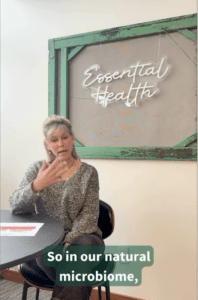Addressing gut health issues begins with understanding what is going on inside the body.
Two common conditions, candidiasis (or systemic candida overgrowth) and small intestinal bacterial overgrowth (SIBO). These are often diagnosed as the source of major disruption of gut health and the body’s microbiome. Essential Health – Bozeman’s Dr. Todd Harris and Kris Bailey, FNP-C, ABAAHP, discuss how to assess and address both conditions to help alleviate symptoms and reestablish optimal gut health.
Candidiasis occurs when the body experiences an overgrowth of a fungus called “Candida albicans,” a naturally occurring fungus usually found in the digestive tract. Systemic overgrowth of this fungus can be caused by antibiotic use, stress, poor diet, or other existing gut-oriented conditions. Symptoms can range from joint pain, skin rashes, bloating, gas, and diarrhea, to yeast accumulation around the body.

“In our natural microbiome, we’re supposed to have bacteria and yeast. They are great and they should balance each other out. But we don’t want to have too many of one or the other, so they have to meet each other in the middle. When we think of a yeast infection, (most people are familiar with that) as most women know exactly what that is. It is uncomfortable and difficult to deal with. It may be a result of taking antibiotics, can be treated, and usually goes away.
Systemic yeast or candida is quite different. If we think back to the gut microbiome, we have an overgrowth of yeast that presents itself in a number of different ways. Some people know they have it and some people have no idea. Some have outward physical presentation with yeast in armpits, breast area, or skin folds, which is pretty advanced systemic candida.
One of the classic signs is intense sugar cravings. Yeast feeds off that sugar – it’s almost like there is a little “demon” inside that that’s really wanting you to eat sugar all the time. It can be pretty hard not to do that when this yeast is prevalent and taking control. Other symptoms of systemic candida can be migraines, fatigue, brain fog. It can be very subtle and hiding and people. It can be a nasty player and one that we don’t want to be carrying around.”
Candida overgrowth is usually treated with antifungal medications, avoiding sugar in the diet, probiotics, and other lifestyle changes that support overall health.
SIBO, on the other hand, is a condition where there is an overgrowth of bacteria localized in the small intestines. This causes bloating, gas, abdominal pain, fatigue, and other symptoms. SIBO can develop through antibiotic use, poor diet, intestinal mobility disorders, diverticulosis, or complications from gastric surgeries.
“SIBO is fascinating. The small intestines generally doesn’t have a lot of bacteria. (Did you know that? Most people don’t!) Most of our bacteria is in our large intestines, but, when our gut is compromised, we might get more bacteria in the small bowel.
Why is that significant? Because a lot of bacteria in the small bowel leads to bloating, abdominal pain, diarrhea, constipation. The small bowel is really important for the absorption of nutrients, so when that’s compromised, our whole body is compromised. The easiest way to test for SIBO is doing what is called a “breath test.” It’s inexpensive and super effective. Basically, what we’re looking for is what kind of gas is coming out of you.
Two of the most common are hydrogen and methane. When you have too much hydrogen, that’s a certain bacteria. When you have too much methane, that’s a different microorganism. The difference is how we treat it. There’s one antibiotic we would use for a hydrogen positive test, and one we would use for a methane positive. It works quite well.
Then, we reinoculate the gut with probiotics. What are probiotics? These are different bacteria that are “good” bacteria that we want in that part of our gut. SIBO is a significant issue and you can prevent it with diet – dietary fiber is super important, avoiding processed foods, eating healthy, eating whole, eating clean.”
If you expect your symptoms might be linked to gut health, speak to our team of experts to start feeling relief today. Request a Meet & Greet at Essential Health – Bozeman by filling out our form linked here or call our office at 406.272.3577.


